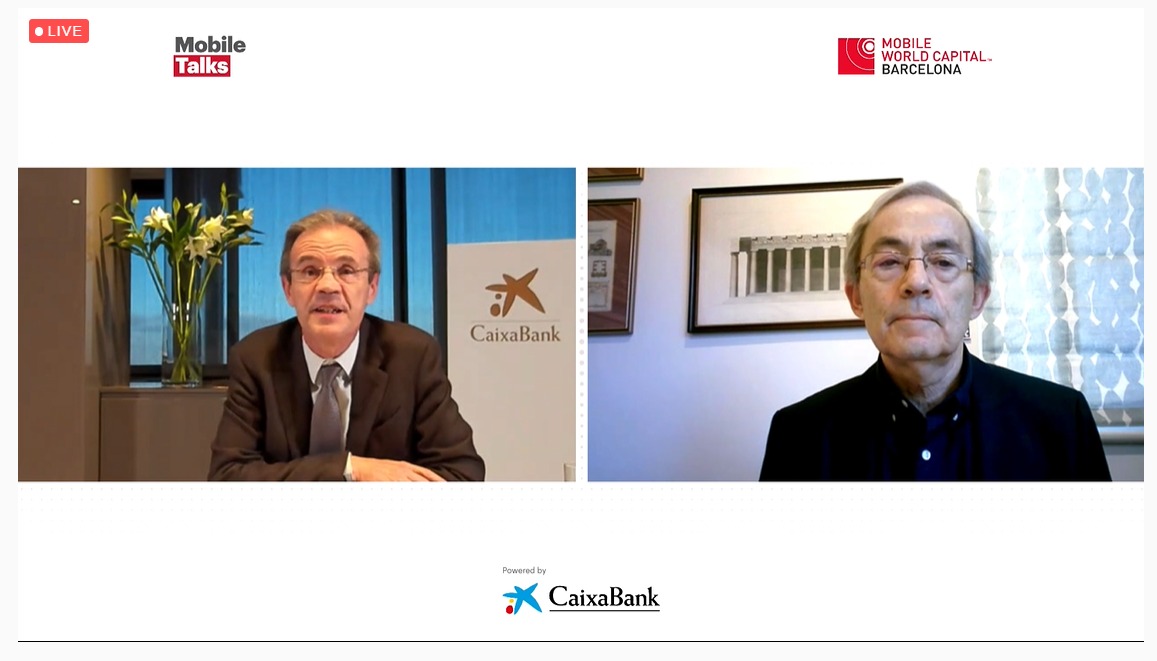
- Jordi Gual, Chairman of CaixaBank, opened the event with a reflection about how consumers, companies and employees have had to adapt to an environment in which work and consumption have become digitized, and drew attention to Pissarides’ contributions to knowledge of market dynamics.

10 February, 2021
Barcelona, 10 February 2021 – Mobile World Capital Barcelona (MWCapital), in partnership with CaixaBank, has successfully inaugurated its new ‘Mobile Talks’, an initiative intended as a platform of global and lasting contents. The first talk, which was held online on Wednesday, looked at the future of work and consumption after the crisis caused by the Covid-19 pandemic.
The session analysed how changes in post-pandemic consumption habits have led to alterations in existing economic, social and cultural models. It featured contributions from Christopher Pissarides, 2010 Nobel Laureate in Economics and Regius Professor at the London School of Economics, Jordi Gual, Chairman of CaixaBank, and different businesspeople from the sectors of retail, consumption and new digital models.
Jordi Gual, Chairman of CaixaBank, opened the event and initially emphasized that “the pandemic has sunk the world economy into the worst recession of modern times, which has forced us to change many of our social and economic habits”. Gual also added that “remote work has now become generalized and expenditure on e-commerce has been growing at a rate of three digits this spring according to in-house data from CaixaBank, which has offered the retail sector a channel to help to soften the impact of the pandemic. Consumers, companies and employees have had to adapt to a new environment”. After welcoming participants, the Chairman of CaixaBank handed over to Christopher Pissarides, whom he described as “a standout economist and thinker”.
Christopher Pissarides’ contribution focused on matters such as the future of professions and local trade, the psychological and sociological implications of online consumption and culture, leisure and tourism in modern times: “The pandemic has introduced a new element into the evolution of work and consumption and that is human connections. This has forced people and companies to adopt new types of behaviour, many of which will persist when the pandemic has finished. They include faster automation, working online and a reduction in mobility”.
Ignacio García Magarzo, General Director of ASEDAS (Spanish Association of Distributors, Self-service Stores and Supermarkets) stressed how locality, trust and consumer service have strengthened the role of food and beverage distribution. According to García Magarzo, “a sector like food and beverages is experiencing the emergence of new concepts such as mixed consumers, who shop both in physical stores and online. We therefore consider both channels to be a complementary feature of what we refer to as digital proximity”.
Similarly, Jacques Reber, Managing Director of Nestlé Spain, gave his company as an example of adaptation to the new needs of consumers: “The food and beverage sector has seen an acceleration of e-commerce. Furthermore, in the Out of Home sector, despite the negative impact of closures of catering establishments, new opportunities have arisen, and these will continue to grow in the future – particularly those involving delivery options and ready-to-eat or takeaway solutions and services”. Reber concluded that “meanwhile, in dealing with the environment, the main challenge is to help to ensure that economic recovery is green, in line with the response to the climate emergency and based on a responsible management of natural resources”.
Sacha Michaud, co-founder of Glovo, stated that “this new paradigm has had a major impact on the economy as a whole. As far as delivery is concerned, mobility restrictions now mean that the sector is providing an essential service, both for the public at large and for restaurants and other establishments”. Michaud likewise underlined that “for small businesses it has meant a tool for speeding up their digitization as over 9,000 restaurants and establishments have joined Glovo since the start of the pandemic and 90% of these are small and medium-sized companies”.
Songül Tolan, researcher on the European Commission’s HUMAINT project (Human Behaviour and Machine Intelligence), nonetheless warned of the potential social impacts of applying technology in the employment market: “Digital transformation and Artificial intelligence will change jobs and the skills required to do them. Although this can potentially make us both more efficient and productive and richer, these benefits must not be allowed to jeopardize people’s welfare. We must make sure that these innovations are people-centred and always respect human dignity”.
Stay up to date about everything
Subscribe to stay up to date with the latest content from Mobile World Capital Barcelona.